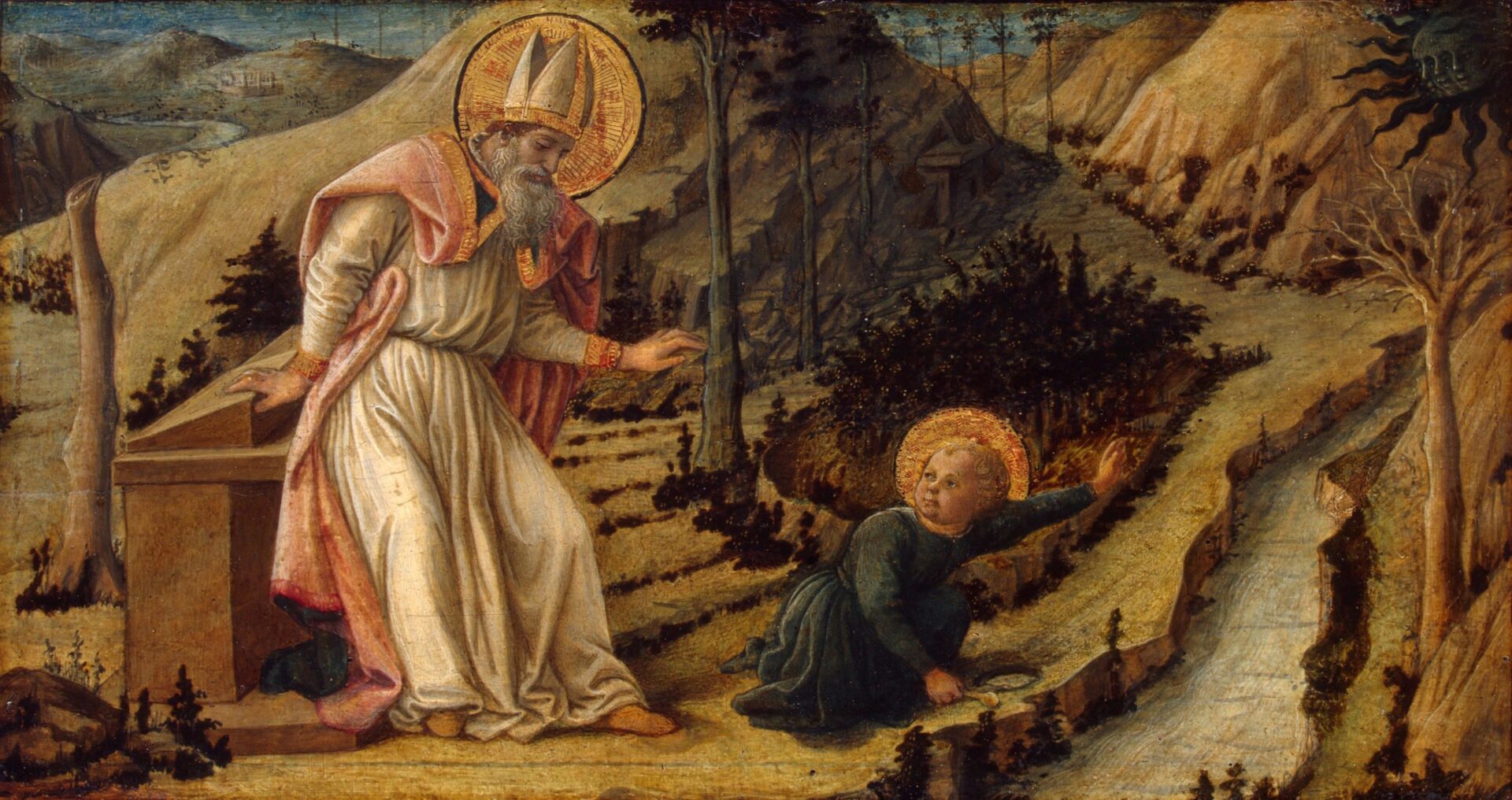Brecon, Wales. If you’re an American sympathetic to agrarianism, then your constellation of influential writers almost certainly includes Henry Thoreau, Aldo Leopold, and Wendell Berry. Their ideas have inspired countless arguments for a social, economic, and cultural return to the land. Your star maps may also contain Izaak Walton, John Muir, Wes Jackson, and even Virgil, whose Georgics were extolled by the 18th-century essayist Joseph Addison as “husbandry put into a pleasing dress, and set off with all the beauties and embellishments of poetry.” I can almost guarantee you, though, that your agrarian constellation doesn’t include Augustine of Hippo.
At first blush, Augustine’s absence is unsurprising given his debt to Neoplatonism with its pessimistic view of material creation. One can cite plenty of passages in Augustine’s massive corpus that exalts the spiritual and eternal over the physical and temporal. Yet he was raised on a farm in North Africa, one of the most fertile parts of the Roman Empire, and he repeatedly demonstrated a thorough understanding of agriculture and an appreciation for an agrarian way of life. For all that, the magisterial encyclopaedia Augustine through the Ages lacks a single entry on agriculture or farming. Augustine, it would seem, has much to say about original sin, predestination, and the Trinity but almost nothing about conservation, sustainable living, or the social benefits of being rooted to the land. Indeed, not a few scholars place Augustine at the center of a tradition of Catholic thought that should be rejected for its denigration of the natural world.
Yet if you turn to his extended commentary The Literal Meaning of Genesis, you’ll find a theological articulation of an almost Jeffersonian ideal of the yeoman farmer. In describing prelapsarian life in Eden, Augustine imagines Adam freely delighting in working his fields and nurturing life for its own sake rather than his needs. In fact, he even proposes what you might call a spirituality of agricultural work, arguing that farmers share a communion with their fructifying Creator. By looking at these ideas more closely, I want to make a case for adding Augustine to your canon of agrarian authors.
Genesis’s account of creation fascinated Augustine. Early in his ministry, he wrote On Genesis: A Refutation of the Manichees and The Unfinished Literal Commentary on Genesis to contest the dualistic cosmology of the Manicheans. He also famously explored the biblical account of creation in the final part of the Confessions. Later, he composed a much longer commentary, The Literal Meaning of Genesis, which he published in 416 towards the end of his life. There is much to be mined in these works for understanding not only the implications of the Christian belief that God created everything ex nihilo but also how a fifth-century theologian understood the natural world. Taken as a whole, they demonstrate his commitment to a natural world that is fundamentally orderly, good, and fecund.
The key passage for Augustine’s agrarianism is found in Book Eight of The Literal Meaning of Genesis where he comments on Genesis 2:8-17. After summarizing his earlier writings about Eden and discussing the Tree of the Knowledge of Good and Evil, he turns his attention to verse fifteen: “The Lord God took the man and put him in the garden of Eden to till it and keep it.” Foreseeing an obvious objection to this verse, Augustine asks
The Lord surely did not wish the first man to work in agriculture, did he? Is it not simply incredible that he should have condemned him to hard labor before sin?
Behind his question lies a theological conviction that perfection must be such that hearts can find their Sabbath rest in the delight of God. We see this idea most famously at the start of Augustine’s Confessions: “You have made us for yourself and our heart is restless until it rests in you.” It was common in Augustine’s day to interpret this along Neoplatonic lines as contemplation, which would seem to preclude work. Indeed, in late antiquity, the intellectual ideal was for a man to have sufficient wealth to devote himself to philosophy while others (i.e. slaves) toiled in their fields.
Augustine could have avoided this problem by identifying “tilling” and “keeping” solely with Adam without any further implications for humanity. Instead, he turns to human experience:
Certainly, we would judge it to be so, had we never seen how some people till the fields with pleasure, such uplift of spirit, that it is a severe punishment for them to be called away from that to anything else. So then whatever delights there are to be found in agriculture, they were of course far and away more complete at that time when neither earth nor sky was putting any difficulty in the way.
If people can find contentment and delight in farming when nature often doesn’t cooperate, how much more pleasure must Adam have experienced when creation worked harmoniously with him? Augustine implies that farming is inherently pleasurable; it is only because of the Fall that it so often became toil.
This doesn’t mean that Adam didn’t have to work. Tilling is tilling however much one enjoys it. But freedom from want and “uplift of spirit” made that work a source of pleasure rather than drudgery. Augustine explains,
You see, there was no distress of wearisome toil but pure exhilaration of spirit, when things which God had created flourished in more luxuriant abundance with the help of human work. As a result the Creator himself would be praised more copiously for having given a soul set in an animal body the rational faculty of working as much as would satisfy its willing spirit, not as much as it would be reluctantly forced to do by the wants of the body.
To understand fully Augustine’s argument, you have to understand his view of delight and its relationship to human freedom. To delight is roughly equivalent to doing as we please. If we experience delight, we feel free, even though we often don’t why. You probably can’t account for why certain things delight you. I don’t know why I prefer walking in mountains to playing sports or cooking to cleaning. I just do. And because I do, climbing steep slopes and cooking our daily meals never feel like drudgery. “Pure exhilaration of spirit” turns even hard work into joy and makes us feel free.
For Augustine, therefore, the perfection of Eden consisted of Adam delighting in an agrarian life, in which his care for the earth fulfilled his paradisal joy and allowed nature to “flourish in more luxuriant abundance.” His delight and care allowed him to experience his work as pleasure. Augustine didn’t think of paradise in terms of luxury and leisure; his Adam doesn’t spend his life feasting and drinking like a Viking in Valhalla. Neither was his life devoted entirely to contemplation (as Platonists might have argued). Rather, Adam represents humanity at it’s best, finding joy, purpose, and fulfillment in the daily care of the earth.
Having answered a possible objection to work, Augustine gives a theological rationale for his agrarian vision by asking two related rhetorical questions. First,
What greater or more wonderful spectacle can there be, after all, or when is human reason more able after a fashion to converse with “The Nature of Things,” than when after seeds have been sown, cuttings potted, shrubs planted out, graftings made, each root and seed is questioned, so to say, on what its inner vita force can or cannot do, what helps and what hinders it, what is the range of the inner, invisible power of its own numerical formula, what that of the care bestowed on it from outside?
Notice what Augustine does rhetorically here. He began this section with a negative question—“Surely, Adam didn’t have to work?”—but now balances that with a more positive and encompassing question—“What could more wonderful than caring for the earth?” His earlier general comment about tilling is answered by a more evocative description of agriculture as a form of love and care. The agrarian life commits us to knowing the earth intimately and caring for it in the same way that God does. We become co-creators freely bending our minds and bodies to serve the flourishing of nature. In other words, Augustine represents humanity’s proper relationship to the world as nurturers rather than exploiters. The goal isn’t primarily to provide for our needs through sowing, potting, planting, grafting, and caring, but to “converse with ‘The Nature of Things’” and to encourage created life to greater abundance. It is literally a labor of love.
Augustine’s probable reference to Lucretius’s De natura rerum is interesting in that it was one of the primary inspirations for Virgil’s Georgics and was written by an Epicurean, a school of philosophy that Augustine rejected. Both works may well have been at the back of his mind as he was considering this passage—Augustine’s Adam is much like Virgil’s gentleman-farmer. If so, we have here a Christian interpretation and development of a pagan ideal, situating agriculture within God’s care and love rather than amidst the influence of capricious gods.
This final point becomes clearer as Augustine concludes his portrayal of Adam with a final rhetorical question.
And then to perceive by these very considerations that neither the one who plants is anything nor the one who waters, but the one who gives the growth, God (1 Cor 3:7), because the work and skill applied from the outside is applied by one who also was nonetheless created and is being governed and directed invisibly by God?
Agriculture thus becomes a spiritual exercise in which the farmer is used by God as a means for giving the growth that God provides all of creation. Indeed, it is a form of communion with the divine. The farmer participates directly in God’s fructifying love of the world.
Augustine’s agrarianism has obvious applications for Christians, reminding us that we were created and redeemed in order to be God’s image-bearing stewards. Far from dismissing nature, the Bishop of Hippo reminds us of our fundamental purpose as carers of God’s garden, finding our purpose, fulfilment, and delight in encouraging the flourishing of creation. But does Augustine also have anything to teach non-Christians?
I think he does. His image of Adam rests on his conviction that the intimate connection between delight, purpose, and freedom lies at the heart of what it means to be human. Pleasure isn’t antithetical to work—Augustine would call that sloth—but rather allows our work to become fulfilling. Really, Augustine is describing what we now call vocation. When we delight in the purposeful work of love, we enable others, including the land, to flourish. If this is true for the individual, then its even truer for a society. Augustine intimates a good society as encouraging its members in such purposeful works of love. Delight, purpose, and freedom thus are at the heart of human flourishing.
From this perspective, the meaningless drudgery that we compel people from factory workers to bureaucrats to undertake is dehumanizing, robbing them of the opportunity to enjoy a fully humane life. Similarly, work that takes people away from the land where they can find their vocation in cultivating that which is intended to be fruitful diminishes their enjoyment of life. And if this is true, then work that prevents such flourishing of nature or harms that which should abound with life is itself evil. Augustine concludes,
Now just as . . . agriculture acts from the outside to ensure the effectiveness of what nature is doing from the inside, so in the case of a human being; as regards the body, what nature is doing for it inwardly is being preserved outwardly by medicine; and again as regards the soul, in order that nature may be blessed within, education offers its services from without. On the other hand, what neglect of cultivation is to the tree, that is what failure to take proper medical care is to the body, is what slackness over studies is to the soul; and what harmful spraying does for a tree, that is what poisonous food does for the body, what inducement to wickedness does for the soul.
The world is God’s farm, his flourishing garden. We find ourselves as his workers in his fields, called to cultivate the land and the souls, minds, and bodies of ourselves and our neighbors—in this way all can be “fruitful and multiply.” That is Augustine’s agrarian vision and why he believed that “man was set up in Paradise to work at agriculture, not in servile toil, but with genuine pleasure and uplift of spirit.”
And, surely, that’s a sentiment to which no good agrarian can say anything but “Amen.”





3 comments
Jesse Hake
Loved your essay. Thanks. Although typically seen as antithetical, there is certainly a place for this even within Platonism: “Both pagan and Abrahamic Platonists have found corporeal nature sacramental. Plotinus …denounced those ‘gnostics’ who despised the earth. Porphyry, his pupil, was until recently the only ‘professional philosopher’ to write at length in favour of ‘the rights of beasts’ (Porphyry 2000). Nor was this at odds with Plato.” —Stephen R.L. Clark (Ancient Mediterranean Philosophy)
Paul Krause
Absolutely wonderful! Always great to see Augustine’s, truly, “pastoral” theology (in both senses) be discussed. There is much neglect in dealing with the Garden/Edenic ideal in Augustine’s thought and its implications for us today.
Mark Clavier
I don’t touch on the Edenic dimension per se, but you might like my book ‘On Consumer Culture, Identity, the Church, and Rhetorics of Delight’ (part of Bloomsbury’s Reading Augustine series), which applies Augustine’s thought to understanding the destructive purchase of consumerism on church and society.
Comments are closed.